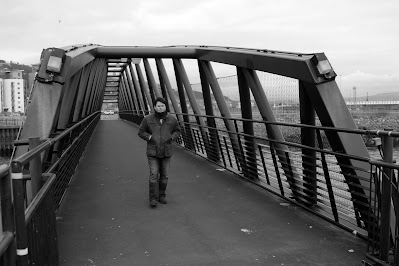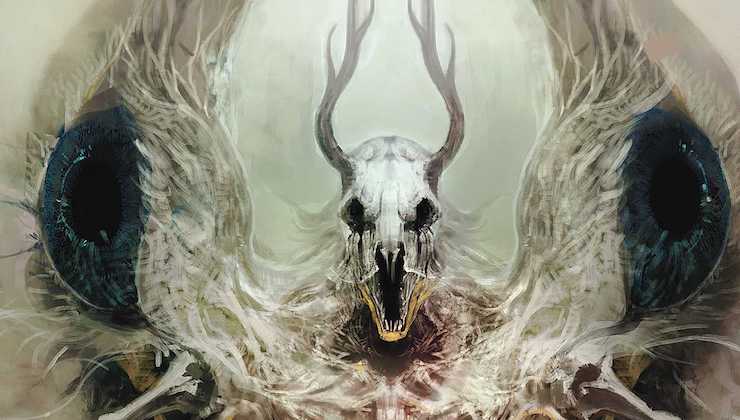J. Rosina Harlow is a frequest contributor to our anthologies. Her story, Of the Woods, will appear in the forthcoming Dark Lane Anthology Vol.14.
Q: What are your working methods? Do you sit down every day to write? Do you have a designated place to work?
A: After an appropriate period of dancing and fasting, I’ll cover all the windows with black lace and light the inspiration candles in my den of prolixity. Then, whilst in a carefully poised shoulder-stand (I can’t do handstands) I’ll take my 16 th Century quill and scratch out the first words of my latest opus preferably with a tawny owl positioned on my right foot.
There, now that I’ve got the reader’s attention...
In reality...I usually have something ‘on the go’; an idea for a story or even a couple, and I’ll devote some time to it whenever I can, usually at weekends. I’ll sit either in our music room at home, outside on a tool box at the allotment or on a fallen tree at the little ‘nature reserve’ down the road, where I can face my favourite tree and scribble! I usually write longhand in a notebook as it flows better and feels more organic. My husband buys me beautiful hardback patterned notebooks for birthdays and Christmas.
I also like to be away from people when I write...I have a friend who always writes in a busy coffee shop but I like seclusion and silence, or a carefully chosen piece of music, usually on headphones so I can be in my own world. Sometimes I’ll have one particular song on loop continually because it captures the ‘vibe’ I’m going for or puts me in the right frame of mind for a particular story, so it’s probably a good job it’s on headphones!
Q: Tell us about one of your favourite short stories and why you like it (not one of your own).
A: This was the hardest question to answer! I knew straight away that it had to be one from my ‘favourite four’ writers; Edgar Allan Poe, Angela Carter, Jorge Luís Borges or Daphne DuMaurier. I then re-read a few of the stories I enjoyed the most (thanks for giving me the impetus to do that!)
Several stories by these writers have been burned into my subconscious as seminal works; Ligeia and The Pit and the Pendulum by Poe, The Erl-King and The Company of Wolves by Carter, El Libro De Arena/The Book of Sand and El Disco/The Disk by Borges.
However, I finally settled on what is probably the least well known of the bunch (because I like being unconventional), and also because, when I started reading it, I was struck by how influential it has been on my writing style.
I picked, (no pun intended) ‘The Apple Tree’ by Daphne Du Maurier. It has a strong slant towards nature, sensuality, and the turning of the seasons, and carries a sense of foreboding and surrealism. It hints at, rather than specifies, the central horrors. I’d recommend it to everyone to read, but in a nutshell, it’s about a widower who has recently lost his wife of some years. Rather than being grief-stricken, it comes to him as a release from living under the shadow of a punitive nag with a martyr-complex. As the story develops though, the central character reveals himself to be a less-than-likeable man and possibly an unreliable narrator. He shamelessly revels in his freedom for a while. Then, however, an apple tree in his garden starts to take on the reproachful and haggard appearance of his dead wife, and it slowly starts to ruin his life. My own short story ‘One Rotten Apple’ (published in Dark Lane Anthology 12) picks up most obviously on this influence. I wrote the first draft when I was living near Chichester, right next door to an apple orchard with a very other-worldly atmosphere...
Q: Tell us about one of your favourite short stories (done by you).
This would have been a different answer before the phenomenon of ‘Fox Mabel’ (published in Dark Lane Anthology 11 and then Dark Lane Omnibus…...among others). That story has been so popular and really seems to have made an impact on people. At the risk of sounding ‘yuk’, I’m very grateful for that. I liked the story when I wrote it- (in fact it’s the only story of my own that made me feel a bit tearful as I finished it) but I have a different appreciation of it now. It’s very different to a lot of my other stuff, despite being dark and based around the natural world. The tone is more reflective and philosophical, and there’s hope, forgiveness and redemption in there, too, which I think are missing from so many of our stories and films nowadays. The title was an intentional homage to Angela Carter’s ‘Wolf-Alice’. Fox Mabel’ has now found a special place in my heart, and the cherry on the cake is the beautiful illustration that Vikki Yeates drew to accompany it. The original now hangs proudly on my wall!
Q: Where do your ideas come from? Do you go looking for ideas – for example by brainstorming, or do you wait for inspiration?
A: Nope! No brainstorming or anything like that. It’s too much like hard work and I can’t ‘force’ myself to write, or it’ll end up as clichéd rubbish. I get ideas from everywhere; conversations I’ve had, podcasts I’ve listened to, books I’ve read, sketches a friend does, music I’ve listened to or clever things my nieces say. I sometimes get ‘fixated’ on a word or an idea that will marinate in my mind for days or weeks before I start writing. Once I feel I’ve got enough ‘impetus’ behind a cohesive plot or even an atmosphere that feels like ‘me’, I scribble like mad until I get it all down on paper (in one of the afore-mentioned notebooks).
Q: Are you a full-time writer? If you have another job, what is it and would you like to become a full-time writer if you could?
A: No. I’m a full-time instrumental tutor/guitarist and singer. I teach guitar and bass one-to-one, run band rehearsals and workshops and help to run a busy music department. That takes up all of my weekdays (and usually the evenings too). Sometimes I do dream of being a full-time writer, but only of fiction. I’ve never wanted a ‘functional’ writing job like editing or journalism; writing for me is wholly creative (although, arguably, journalists are amongst the most creative of all writers...but we won’t go there…) I always say that my main job is so full on that when writing becomes prescriptive or a chore, I stop and redirect my energy into something I enjoy more. Writing is my escape from the day-to-day. I also don’t think that writing full-time would suit my temperament- I’d quickly become morose! I’m an ambivert, so after a quiet and introspective day, I crave being around people, whether it’s friends,colleagues or children, to keep me feeling ‘alive’.
Q: What is the most difficult part of your creative process?
There are so many difficult parts! Getting a story published is probably the most difficult part, but it’snot creative...I also find ruthless editing and re-drafting very tricky, and getting the cats off the keyboard for long enough to type is a challenge in itself. But I’d have to say that it’s always a nerve-wracking process when I first send a story to someone else for a critique or comments. I have two amazing friends who proof-read and critique for me and they always find interesting angles in the stories that I haven’t seen (or ways to make it better). Sometimes I pass it to my lovely husband to read and, particularly if it’s slightly historical in nature, he’ll quickly point out the faults! I once heard a brilliant quotation that showing your work to someone else for the first time is a bit like showing them a ‘naked selfie of your brain’….I’m sure I’ve scarred a lot of people for life!
Q: If you could go back in time, what would you say to your younger self about becoming a writer?





.jpg)








